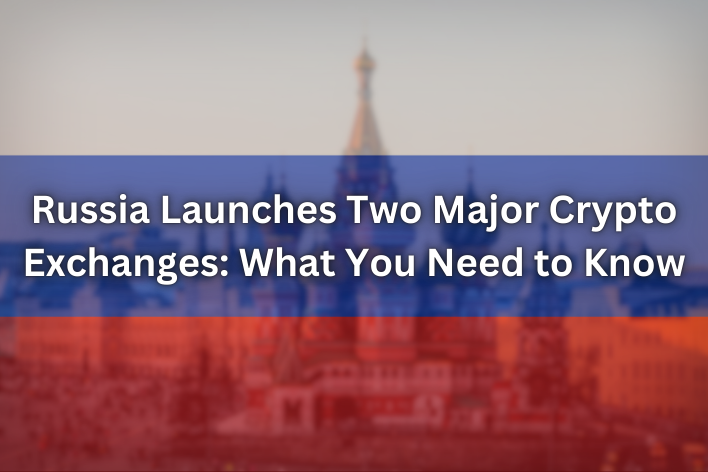Russia Launches Two Major Crypto Exchanges: What You Need to Know
Introduction:
Russia is making significant strides in the cryptocurrency sector, positioning itself as a key player on the global stage. With the launch of two major government-backed crypto exchanges, Russia aims to bolster its digital financial ecosystem, particularly in cooperation with BRICS nations—Brazil, Russia, India, China, and South Africa. These exchanges, focused on the development of stablecoins linked to the Chinese Renminbi and the BRICS currency basket, represent a strategic move to enhance economic collaboration and reduce reliance on the US dollar. As Russia navigates the complexities of global sanctions and evolving regulations, these exchanges could play a pivotal role in shaping the future of digital finance in the region and beyond.
Russia’s Crypto Landscape:
Russia's approach to cryptocurrency regulation has been cautious, characterized by a blend of progress and ambiguity. The cornerstone of its regulatory framework is the Federal Law No. 259, which provides a legal basis for digital financial assets (DFAs) but falls short in addressing the operational specifics of cryptocurrency exchanges. To explore the potential of digital assets more safely, Russia introduced the Experimental Legal Regime (EPR), a controlled environment where businesses can test crypto innovations under government oversight. Despite these efforts, significant regulatory gaps remain, particularly in defining the status and operation of crypto exchanges. This uncertainty poses challenges for broader adoption and the establishment of a clear legal framework, leaving room for future adjustments as the country navigates this evolving landscape.
Focus on the New Exchanges:
Russia is planning to launch two major government-backed crypto exchanges in Moscow and St. Petersburg, marking a pivotal moment in its digital finance strategy. These exchanges will primarily focus on the development and use of stablecoins, particularly those linked to the Chinese Renminbi and the BRICS currency basket. This move aims to enhance economic cooperation among BRICS nations by providing a robust alternative to the U.S. dollar for international trade, fostering greater financial integration within the alliance. The exchanges are designed to support Russia’s foreign economic activities, creating a secure and regulated platform for transactions. However, the rollout faces challenges, including the lack of a comprehensive regulatory framework and the looming threat of global sanctions. These risks could hinder the exchanges' operations and limit their appeal to international users, complicating Russia's broader economic objectives. If successfully implemented, these exchanges could redefine digital finance in the region, offering a new pathway for cross-border transactions and economic collaboration.
Regulatory and Sanction Risks:
The introduction of new government-backed crypto exchanges in Russia comes with significant regulatory and sanction-related risks. Given the geopolitical climate, these exchanges are likely to face intense scrutiny from global financial regulators, particularly in countries that have imposed sanctions on Russia. The transparent nature of blockchain transactions could expose these exchanges to further sanctions, potentially leading to blacklisting and the freezing of assets linked to them. For users within Russia, these risks could result in restricted access to international markets, limiting the liquidity and usability of their digital assets. International users might also be hesitant to engage with Russian exchanges due to fears of inadvertently violating sanctions, which could severely hamper the exchanges' growth and adoption. Additionally, the current regulatory framework in Russia lacks clarity, making it challenging for these exchanges to operate without facing potential legal uncertainties. As Russia pushes forward with its crypto ambitions, these regulatory and sanction risks remain critical obstacles that could shape the success and global acceptance of its new digital financial infrastructure.
Conclusion:
Russia's foray into the cryptocurrency space reflects a strategic blend of ambition and caution, underscoring both significant opportunities and formidable challenges. The country’s efforts to establish a regulatory framework and promote blockchain innovation highlight its intention to leverage digital assets as a tool for economic growth and technological advancement. The development of national digital currencies, coupled with an increasing focus on crypto mining and blockchain technology, signals Russia’s commitment to becoming a pivotal player in the global crypto arena.
However, this journey is not without its hurdles. The need for a robust regulatory framework that balances innovation with security remains critical, as does addressing international sanctions and geopolitical tensions that could impact Russia’s crypto ambitions. The evolving legal landscape and the global crypto market’s volatility pose additional risks that Russia must navigate carefully.
Russia stands at a crossroads, with the potential to harness the transformative power of cryptocurrency and blockchain technology while facing a complex array of challenges. Its strategic moves in the coming years will be pivotal in shaping its role in the global digital economy, determining whether it can capitalize on its opportunities or be hindered by its obstacles.





